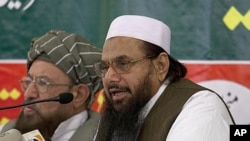Protesters across Pakistan rallied in the streets Friday to condemn the United States' $10 million bounty for information leading to the arrest or conviction of Hafiz Mohammad Saeed.
Saeed founded Pakistan-based militant group Lashkar-e-Taiba, which allegedly plotted the 2008 terrorist attack in India's financial hub, Mumbai. The siege killed 166 people, including six Americans. The U.S. officials announced the $10 million reward earlier this week.
Hundreds of Islamist activists demonstrated in the capital, Islamabad, and the northwestern city of Peshawar on Friday.
Members of the Defense Council of Pakistan, an alliance of right-wing, religious and extremist groups, also protested in the cities of Lahore and Muzaffarabad, chanting anti-U.S. slogans and support for Saeed.
"The USA has done an unconstitutional and unlawful act," said Molana Shaikh Yaqoob, Central leader Defense Council of Pakistan. "If they have some evidence or proof against Hafiz Saeed, even then they should have adopted the law."
Pakistani Prime Minister Yousuf Raza Gilani on Thursday criticized the U.S. decision to place a bounty on Saeed. The cleric operates openly in Pakistan, appearing on talk shows and addressing public rallies in which he criticizes the United States.
Gilani said the U.S. should have informed Pakistan before taking such a move because there is no solid evidence against Saeed, adding that such negative messages would only widen the trust deficit between both nations.
Pakistan's parliament is currently debating a new framework for ties with the United States, following the mistaken killing of 24 Pakistani troops in a cross-border NATO strike last November.
In recent months, Saeed has used his high-profile status among right-wing groups in Pakistan to help lead a protest movement against Pakistan reopening its ground route for NATO supplies into Afghanistan.
Pakistani authorities closed the border crossings following the coalition strike that killed Pakistani troops late last year.
Some information for this report was provided by AP, AFP and Reuters.













